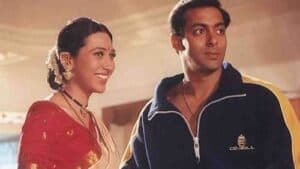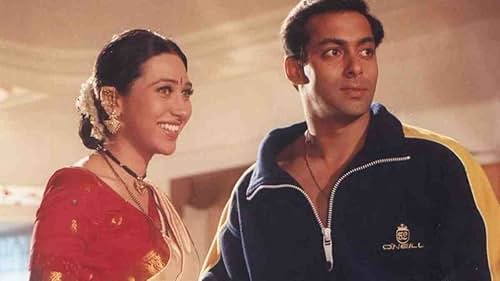 Picture Credit: Pooja Entertainment
Picture Credit: Pooja Entertainment
When Biwi No. 1 first hit theaters, it was the peak of Bollywood’s indulgence in comedy and family-oriented drama, a genre that was popular with audiences at the time. The film featured the typical over-the-top humor, mistaken identities, and a hero caught between two women — his wife (played by Karisma Kapoor) and his mistress (played by Sushmita Sen). It became famous for its catchy dialogues, humor, and larger-than-life portrayal of family and relationships. The film was a commercial success, cementing its place as a quintessential 90s Bollywood entertainer.
Fast forward to 2024, and the world of cinema has changed drastically. Bollywood is now more attuned to evolving societal norms, progressive themes, and contemporary storytelling, with films like Gully Boy, Piku, and Zindagi Na Milegi Dobara leading the charge. In contrast, Biwi No. 1’s plot, themes, and humor seem outdated, with its portrayal of gender roles, relationships, and societal expectations feeling uncomfortable in today’s world.
One of the key factors that will likely affect the film’s success on its re-release is the changing preferences of moviegoers. The audience that once flocked to watch Biwi No. 1 in the late 1990s has evolved. Today’s cinema-goers are more selective and gravitate towards movies with a deeper, more meaningful message or ones that reflect current-day issues. While Biwi No. 1 was a fun, light-hearted movie, its appeal was rooted in a simpler time when audiences were less discerning and more willing to overlook problematic aspects of a film’s narrative.
Modern Bollywood films are shifting away from the stereotypical family dynamics and gender biases that were often portrayed in the 90s. In Biwi No. 1, the humor largely stems from infidelity and misunderstandings, themes that may not resonate well with today’s socially conscious audience. With the rise of progressive content and films that tackle real-world issues like mental health, gender equality, and social justice, Biwi No. 1’s comedy may appear hollow or even regressive to today’s audience.
This is not the first time an older film has attempted a re-release in Indian theaters. Recently, films like Karan Arjun (1995) were re-released with the hope of capturing the nostalgia of their original audience. However, Karan Arjun failed to make a significant impact at the box office during its re-release. The movie’s outdated special effects, formulaic storyline, and melodramatic elements left modern viewers unimpressed. This is a strong indicator that a re-release of a film, no matter how popular it once was, is not guaranteed to replicate its original success.
The notable exceptions to this trend have been films like Veer Zaara (2004) and Kal Ho Naa Ho (2003). These films managed to do substantial business during their re-releases, largely due to their emotional depth, universal themes, and continued cultural relevance. Veer Zaara, for example, still holds an emotional place for many viewers, and its nostalgic value was enough to attract a sizable audience. However, films like Biwi No. 1, which are deeply entrenched in the comedic and dramatic styles of their time, have not fared as well in re-releases.
While Biwi No. 1 might evoke nostalgia for fans who grew up watching it, it’s unclear if that alone will drive audiences to theaters in 2024. Today’s moviegoers are more inclined to seek content that feels fresh and relevant. The nostalgia factor, which was enough to bring audiences to the theaters in the past, may not have the same appeal now. In fact, many younger audiences might not even connect with the film, having grown up watching more modern Bollywood films or even international content with better production values, compelling storytelling, and a more inclusive representation of characters.
While Biwi No. 1 may enjoy a small surge in interest due to its nostalgic appeal and the presence of big stars like Salman Khan, its chances of replicating the success it once saw at the box office seem slim. In an era of cinema that values innovation and sensitivity to modern societal values, a 1999 film with outdated humor and dated themes is unlikely to strike the right chord with contemporary viewers. Unless the re-release is part of a special event that enhances the nostalgia factor, Biwi No. 1 will likely struggle to win over today’s audience, just as Karan Arjun did earlier this year. The past may have shaped the Bollywood industry, but it’s the future that will determine what kind of films truly resonate with audiences today
